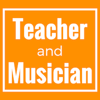There’s a definite theme of assessment in this week’s reading roundup, with Anna Gower’s new...
Reading Highlights 4
There’s quite a wide range of topic in this week’s reading highlights. Listening, photography, paying attention and technology. If there’s a consistent theme in this selection, then it is the need to constantly be aware that music is different to other subjects in a school. The first article reminds us that ‘thinking in sound’ is something only likely to be required in the music classroom while the second post shows the related but different skills required of a photographer. The third piece looks at the simultaneous demands on a musician and the last reminds us that music educators need different software solutions compared to other teachers.
With an increasing number of ‘whole school systems’, it’s easy to forget that music is different. It has different needs and is taught differently. Rather than seeking parity with other subjects in some sort of quest for ‘equal status’, it seems to me that we should celebrate the difference of our subject and take pride in the unique range of skills required to both teach and learn music.
John Finney: Foundational listening in the music curriculum
I’ve been doing my own bit of thinking about the role of listening in the classroom, so I was quite keen to see what John Finney had to say on the topic. I was already aware of his fondness for ‘audiation’ and ‘thinking in sound’ as more appropriate terminology for what we are trying to achieve and his mention of sight-singing in this post advances the discussion somewhat. I would venture further to suggest that an instrumentalist is continually comparing what (s)he plays in response to the version being played in his/her ‘mind’s ear’. I can’t be the only person who has ever tried to cover up the wrong note through a quick glissando… It’s expressive after all…
Emile Holba: My camera view
This piece may not be entirely focused on music education but it’s fascinating to read about Emile Holba’s work to document Musical Futures through the medium of photography. He’s been so close to many pivotal moments in the growth of Musical Futures that his insight’s are always genuinely valuable. It’s nice to see how he has developed a process for taking shots for MF and the attention to detail is reminiscent of an expert musician. It’s often suggested that music departments have a lot to learn from the PE department; Emile’s writing here should encourage us all to talk to a few photography teachers.
Walter Bitner: Wholehearted attention
Walter Bitner’s article picks up where my thinking about Emile Holba’s post left off; music teachers are often isolated and face a lack of understanding from teachers of other subjects. He goes on to discuss the huge variety of skills that a musician needs to succeed and the “wholehearted attention” that this requires. I can’t help but think that the same is true of a music teacher. Constantly listening to the sound made by a class of thirty children, making instantaneous formative assessments, taking corrective action or choosing not to do so (based on knowledge and experience) while being aware of how long it is until the bell goes. If that doesn’t take “wholehearted attention”, then I don’t know what does.
Christopher J Russell: Showbie…an incredible iPad tool for $100 per year
The first person to bring Showbie to my attention was Stephen Jackman, who wrote a great blog post on the topic. As a result, I was more than keen to read another tale of how this app can be used in the music classroom. Christopher J Russell has clearly fallen in love with the app and it makes for interesting reading to scan through a list of bite-sized ideas for using Showbie in the music classroom. Anyone already using (or considering using) Showbie should certainly have a read.

